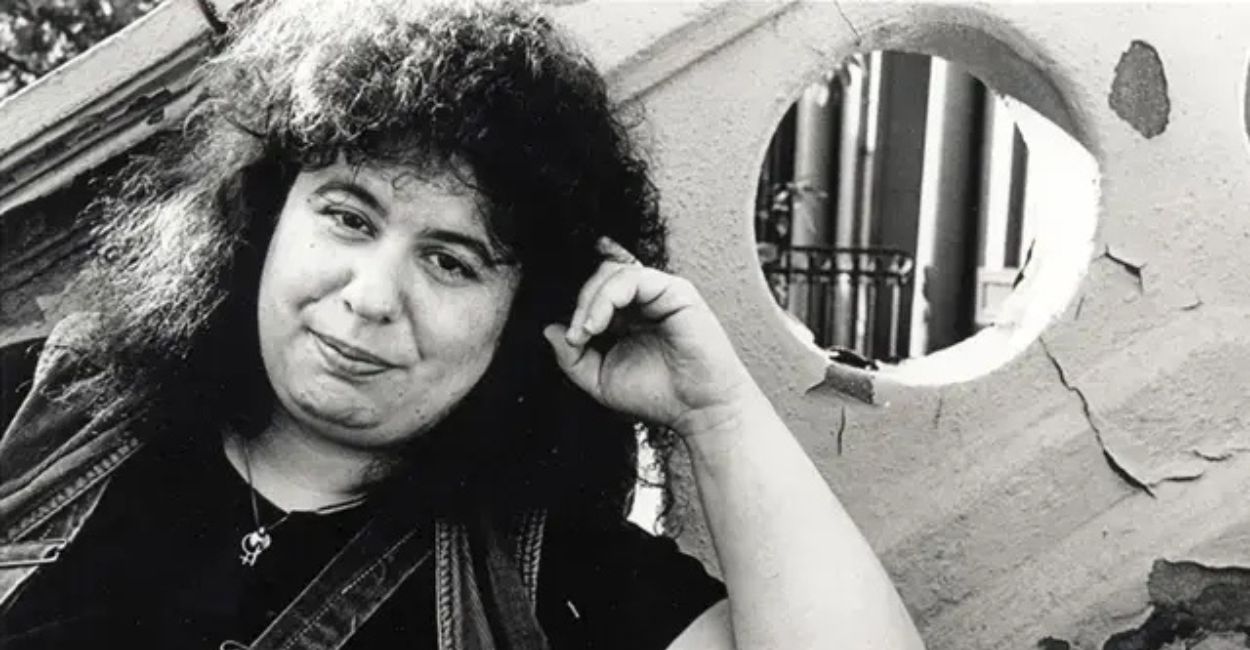Andrea Dworkin’s fierce writings on sex, power, and patriarchy remain profoundly relevant today. From Intercourse to her fiery “24-Hour Truce” speech, Dworkin exposed the deep inequalities embedded in sexual relations and male dominance. This essay revisits her legacy, controversies, and the seismic impact of her radical truths in the era of #MeToo and modern feminism.
Can equality truly exist in the face of unequal sexual relations — say, between a husband and a wife? This is essentially the fundamental question that Dworkin repeatedly raises throughout her many years of work. I’d push that one step further and ask: assuming the presence of a largely equal and healthy nature of sexual relations in a heterosexual couple, does the male still really view his wife as an equal, in its truest essence? It’s hard to know, but not that hard also.
Consider an example from my neighborhood: the husband doesn’t have the spine to urge and confront his own reluctant parents to come support their daughter-in-law with raising a one-year-old, such that she could utilize her double M.A.s outside of her home and start a career — at least in some capacity. Nor does he favor daycares. I am not implying that he looks down upon his wife, but that there’s no equality existing in that home in any real sense, nor are there efforts being made to foster the same.
Dworkin asks in her fiery speech “I Want a 24-Hour Truce During Which There Is No Rape,”
“Why are you so slow? Why are you so slow to understand the simplest things? The clichés. Simply that women are human to precisely the degree and quality that you are. Every three minutes a woman is being raped. Every eighteen seconds a woman is being beaten. There is nothing abstract about it. The power exercised by men day to day in life is power that is institutionalized.”
Dworkin emphasizes the fact that it truly is an extraordinary thing to understand and confront — why is it that men believe they have a right to rape? They might not accept it when asked, but in life, they do believe they have the right to force sex — which they don’t call rape. Why else would they force sex? And it is an equally extraordinary thing to understand that they believe they have the right to buy a woman’s body for sex — that that is a right. It’s a fundamental yet compelling question.
A thing about equality, she clarifies, is that it cannot coexist with rape. And it cannot coexist with pornography or with prostitution or with the economic degradation of women on any level, in any way — because implicit in all those things is the inferiority of women. “It is astonishing that in all our worlds of feminism and anti-sexism we never talk seriously about ending rape. In the back of our minds, are we holding on to its inevitability as the last preserve of the biological?”
“Have you ever wondered why we are not just in armed combat against you? It’s not because there’s a shortage of kitchen knives in this country. It is because we believe in your humanity — against all evidence.”
“I speak for many feminists, not only myself, when I tell you that I am tired of what I know and sad beyond any words I have about what has already been done to women up to this point… And I want one day of respite, one day off, in which no new bodies are piled up, and I am asking you to give it to me… Even in wars, there are days of truce. Stop your side for one day. I want a twenty-four-hour truce during which there is no rape. I leave you here to do that for me and to expose patriarchy as a negative, anti-life power dedicated to its own perpetuation, and for the women whom you say you love.”
Andrea Dworkin died of heart disease in 2005, at age fifty-eight, and feminism lost perhaps its most inflammatory voice. Unlike many of her fellow second-wave feminists, Dworkin’s fight was more existential and revolutionary in nature — and less pragmatic — than a fight for equal rights, equal pay, and equal representation. She wanted to erase patriarchy altogether, along with capitalism, racism, homophobia, war, pornography, and, most urgently, rape.
“The commitment to ending male dominance as the fundamental psychological, political, and cultural reality of earth-lived life is the fundamental revolutionary commitment,” she wrote in 1974. Her tone was combative and her eloquence borne of her own experiences as a prostitute, rape survivor, and battered wife. She did lack nuance at many points, but her influence remains seismic. Synopses of her work like she hated men; all sex is rape; she was a humorless feminazi — are far from the truth.
Last Days at Hot Slit, a new collection of excerpts from Dworkin’s speeches, nonfiction, and novels, aims to make better sense of her complicated legacy. She attacks pornography and implicates its consumers in rape, but also exposes how it feeds directly into the domination-subordination dynamic and the sadomasochistic culture that defines patriarchy and sex-based oppression. Last Days also reveals a more measured writer than many might remember. The book highlights her meticulously lucid style, her wit, and her vulnerability.
Indeed, she is more relevant than ever before. In an era of MeToo and Women’s Marches, as well as many self-proclaimed “nasty, angry, bad feminists,” her works resonate much more. As relentless and provocative as she was, she was also equally methodical and clear.
In My Life as a Writer, she explains:
“I saw adults as gatekeepers who stood between me and the world. I hated their evasions, rules, lies, petty tyrannies. I wanted to be honest and feel everything and take everything on. I didn’t want to be careful and narrow the way they were. I thought a person could survive anything, except maybe famine and war, or drought and war. When I learned about Auschwitz, my idea of the unbearable became more specific, more informed, sober and personal.”
She wanted honesty — total and complete honesty. Probably because, as she wrote, she felt everything and took it on, more deeply and openly than most could.
Her activism was systemic and intersectional from the very beginning, factoring in not only gender but also economics, history, and culture into her analysis. She critiqued white women for the privilege they hold and benefit from at the expense of Black women, claiming that any attempt to hold on to privilege and comfort was destructive, criminal, and intolerable. She held sexism accountable as the fundamental basis for all injustices in the world.
For Dworkin, there is no element of blameless fantasy to pornography. It is not benign. There is only brute exploitation and the material harm done to women. Nor is there the possibility of women who genuinely enjoy consuming or appearing in pornography. It is today an almost offensive line of thought — when women in porn are entrepreneurs and sex work is recognized as legitimate, self-determined labor rather than the last resort of dead-end people.
When she wrote that “violation is a synonym for intercourse,” and implied that vaginal penetration is a kind of imperialism, Dworkin consigned herself to a fatal misrepresentation: all sex is rape. Dworkin spent the rest of her career denying this tagline that now came to be associated with her, but in vain. Her interpretation also left little room for male sexual pleasure not based on violence or oppression. By virtue of having a penis, men are guilty — or close to being guilty — of abuse, if one waits long enough.
What she meant, if we take her word for it, is that sex based on aggression — that is, sex in which male desire and the male orgasm are paramount — violates women. In Dworkin’s words: “All personal, psychological, social, and institutionalized domination on this earth can be traced back to its source: the phallic identities of men.” Yet her own life proved this proclamation wrong: in 1998 Dworkin married her longtime friend, gay writer and editor John Stoltenberg, with whom she had a relationship of loving mutual support, seemingly absent of male domination.
“If you are afraid of the ascendancy of fascism in this country... then you had better understand that the root issue here has to do with male supremacy and the control of women; sexual access to women; women as reproductive slaves; private ownership of women,” she wrote in 1983. This still encapsulates much of the GOP’s legislative agenda today. Consider the 2022 overturning of Roe v. Wade (1973), effectively rendering abortion rights unconstitutional and making it possible for states to ban abortions.
She was much more than a signaler of alarming misogynistic deeds or a misandrist, as critics make her out to be. She explained, with absolute clarity, how much women have to suffer, sacrifice, and endure in their lives. She died having been largely renounced by the women she dedicated her life to championing. Most of her books were out of print; publishers were not keen to see new work; invitations for speeches and lectures had slowed. She was dismissed as an extremist or a fringe figure — or, worst of all, a “pitiable figure.”
She was unafraid to be an unapologetic, stereotypically angry woman. In her own life, she dealt with much abuse, mockery, vilification, abandonment, and misinterpretation — and fought against much of it, which makes her far from some pitiable figure.
She is worth revisiting, after years of being disparaged and maligned, as now the MeToo movement contemplates sexual harassment with a magnifying glass — which makes her understanding of the politics of gender and sex all the more essential.
She brought a certain unprecedented urgency to the struggle against sexual violence that she had so intimately known. She once told her mother off in a letter, saying, “YOU MUST COME TO KNOW ME AND RESPECT ME AS I AM, NOT AS YOU ARE, NOR AS YOU WANT ME. OTHERWISE WE CAN NEVER TALK HONESTLY.”
Her book Intercourse (1987) is perhaps her most radical and reviled text. Her extremely prescient and precise description masks something so fundamental that everyone must have thought of it at least once in their lifetimes, if not more. Just think about it — “When two individuals come together and leave their gender outside the bedroom door, then they make love. If they take it inside with them, they do something else, because society is in the room with them.”
Among the important themes in the book was the idea that under patriarchy, sexuality is always experienced as a gendered activity and is always about power — and the idea that, in any society, sexual consent should mean more than just compliance.
Dworkin was also revolutionary in the way she drew publicly, explicitly, and repeatedly on her lived experience of rape, domestic violence, and sex work.
“You tell the truth and people shit all over it … but somehow once it’s said it can’t be unsaid; it stays living somewhere in someone’s heart.”
Noted intellectual Catharine MacKinnon ensured Dworkin’s presence through an op-ed piece published in The New York Times, in which she states, “Her voice was fresh, her ideas original and powerful,” and “the range of her literary contribution alone is exceptional.”
MacKinnon states, “How she was treated [in life] is how women are treated who tell the truth about male power without compromise or apology. It is why few do.” Dworkin wrote, “I still think it is worth everything to say what you believe. There are always consequences, and one must be prepared to face them. In this context there is no free speech and there never will be.”
Dworkin never actually wrote that all sex is rape, a claim often attributed to her, but she did see heterosexual intercourse as almost metaphysically degrading, calling it, in her 1987 book Intercourse, “the pure, sterile, formal expression of men’s contempt for women.” Feminism would spend decades defining itself against her bleak, dogmatic vision.
Who are the men you know that actively discuss changing social norms? Or discuss their own, deeply gendered nature? In effect, men deal with their nature alone and apart, as there is no continuing education. It’s limited to sex education for boys, and then the demands of masculinity impose themselves on men as they get out in the world: show no vulnerability, and solve all your problems alone. The resulting norm is ignorance.
Which is how we wind up where we are today: having a public conversation about male sexual misbehavior, while barely touching on the nature of men and sex. Sex itself is about power as much as it is about pleasure. Do the ideologies of men really matter or make a difference? Does the idea of honest self reflection about what they are, really resonate with men?
How are we supposed to create an equal world with healthy sexuality when male mechanisms of desire can be so inherently brutal? Andrea prominently grappled with this question and urged us to face them. If anything can save us, it is not just feminism but re-contemplating masculinity, and reckoning with the monster within.












